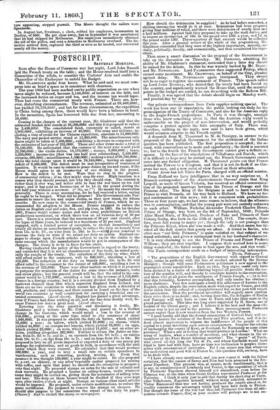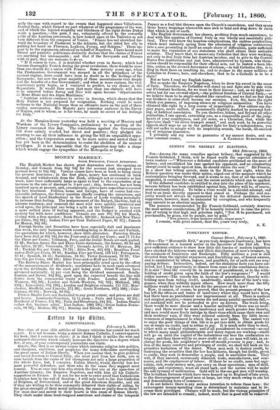Our private correspondence from Paris supplies nothing special. The' week
has been one of expectation, the public looking out daily for the promulgation of the Treaty of Commerce, and also for the Austrian reply to the Anglo-French propositions. In Paris it was thought, amongst those who knew something about it, that the Austrian reply would be unfavourable on the project of non-intervention, and would probably comprise a protest against the faits accomplis of Italy. There was, therefore, nothing in the reply, now said to have been given, which would occasion surprise in the French capital.
A despatch from M. Thouvenel to M. de Persigny, in answer to the proposals of the English Government for the settlement of the Italian question has been published. The first proposition is accepted ; the se- cond, with reservations as to mode and opportunity ; the third is assented to; but to the fourth the French Government cannot give a definite re- sponse. In the face of the stipulations of Villafranea and Zurich, which it is difficult to hope may be carried out, the French Government cannot enter into any formal obligation. M. Thouvenel points out that France invited the Powers to a Congress, and that it is not its fault if no Con- gress has met, and a new point of view forced on their attention. Count Arese has left Turin for Paris, charged with an official mission,
From Holland we have intelligence that in no way surprises us. A Brussels correspondent of the Amsterdam:ache COUratli states that King Leopold, as uncle of Queen Victoria, has received an official communica- tion of the projected marriage between the Prince of Orange and the Princess Alice. The King of the Belgians is said to have invited the Prince to visit Brussels, on his way back to Holland. We bare no for- mal confirmation of this news ; but it is consistent with probabilities. Three or four years ago, we had some reason to believe, that the alliance° was in contemplation, and that the young pair were not entirely unknown to each other. William Nicholas Alexander Frederick Charles Henry, Prince of Orange, was born on the 4th of September, 1840; Princess Alice Maud Mary, of England, Duchess of Saxe and Princess of Saxe Coburg Gotha, was born on the 25th of April, 1843. The couple, there-
fore, seem full young to marry yet ; though the lady is not younger than the Princess Royal, when she was made a wife. And that union has fal- sified all the dull stories that gossip set afloat. A friend in Berlin, who often sees "our little Princess," is quite satisfied on that subject of na- tional solicitude, and gives a testimonial trait in her husband's character. " It is very charming to see the Prince of Prussia and Prince Frederic William ; they are ever together. I suppose their mutual love is some- thing wonderful ; the father seems to lean upon the son, and vice versa." Our Turin correspondent sends us a budget of interesting information.
" Tlif w, February 7.
" The propositions of the English Government with regard to Central Italy, chime in perfectly with the line of conduct adopted by the Cavour Ministry ; though with some Piedmontcse politicians a new appeal to the population seems uncalled for. Such an idea, they argue, coald only have been dictated by a desire of establishing beyond all possible doubt the na- ture of the popular will, and thereby to conciliate Austria to the annexation, and those who at all guess the sentiments of Francis Joseph, ought to feel that this formality, however aecomplished, will only render his obstinacy more obstinate. Very few anticipate a bond fide adherence of Austria to the English points, despite the reservation made with regard to Venice, and still fewer think that the refusal of a straightforward fiat on her part will retard the annexation. That the provincial assemblies will eagerly anew confirm their votes there is no doubt ; and, having done this, the delegates of Emilia and Tuscany will only have to come to Turin and take their seats in the grand parliament. This idea was long since suggested by M. Sineo, one of leaders of the liberal party ; and I believe it is the best and the most effi- cacious way to put an end to the proviso. More encouragement Piedmont cannot expect than it now receives from the two Western Powers. " I need hardly add that the formal annexation of Central Italy will ne- cessarily hasten the solution of the Savoy and Nice question, and it is in- deed almost mysterious to witness the indifference of the people of this capital to a point involving such serious consequences. Imagine the scheme of exchanging the county of Kent, or Scotland, for Normandy or some other province ! What a stir of feeling that would produce in London ! What an array of leaders, what a number of meetings, and what change in the at- mosphere of the Fleet Street debating societies! The " gents " of Turin, who crowd all day long the Via. di Po, and whom Garibaldi would have liked to bare had with him, have no time nor inclination to perplex them- selves with annexations of territories. Yet I can assure you that whatever the moderation and good will of France be, this question will, ere long, have to be dealt with. "I have already once mentioned, and can now repeat it with the fullest
certainty, that the cession of Savoy and Nice had been promised to the Em- peror Napoleon. This promise was, of course, made conditionally, that is to say, in consideration of Lombardy and Venice, to the acquisition of which by Piedmont Napoleon showed himself not disinclined, even before the Crimean war, at the time when Count Gallina represented Piedmont at the Tuileries. I think it only just to add that during his short stay at Turin, after -Villafranca, Napoleon himself, without being solicited, intimated to Victor Emmanuel that war not having produced the results aimed at, he readily renounces the advantages which had been held forth to France. But though the issue of the war had thus left Piedmont free from all obli- gations towards France, this as your readers will perhaps see is not ex-
actly the case with regard to the events that happened since Villafranca. Central Italy, which formed no part whatever of the programme of the war, and of which the bigoted stupidity and blindness of the right divine Dukes made a question,—this gain, I say, voluntarily offered by the cowardly pride of the Austrian proconsuls, is now looked upon at the 'fuileries as not very different from the conquest of Venice. France has not stretched for- ward the boundary of Piedmont to the Adriatic, but she aided her ally in putting her hand on Florence, Leghorn, Parma, and Bologna.' 'These ap- pear to be the arguments advanced on behalf of Napoleon. I have heard moat liberal and patriotic politicians distinctly declare that the claims of France are anything but unreasonable ; and that if the Savoyards and Niceane wish to part, they are welcome to do so. " If it comes to vote, it is doubtful whether even in Savoy, which had become thoroughly French during the great revolution, there would be more than'one-fourth for a union with France. Some seventy years ago, when thq Piedmontese Government was steeped in all the prejudices of the ancient regime, there could have been no doubt as to the feelings of the Savoyards ; but now the great majority of these mountaineers very deeply feel the benefits of a free Government; and what is more curious, the very reactionary party begin, as I ventured to predict, to cry shame at the Separatists. It would thus seem that more than one obstacle will have to be removed before Savoy and Nice will again become departements de Mont Blanc and des Alpes Maritimes.' "Austrian soldiers continue to arrive in Ancona, which shows that the Holy Father is not prepared for resignation. Nothing could be more welcome to the National troops than an offensive move on the part of these motley mercenaries. His Majesty gave yesterday audience to the Envoy of Naples, and to whom, as is his wont, he made no secret of his feelings for Italy."































 Previous page
Previous page